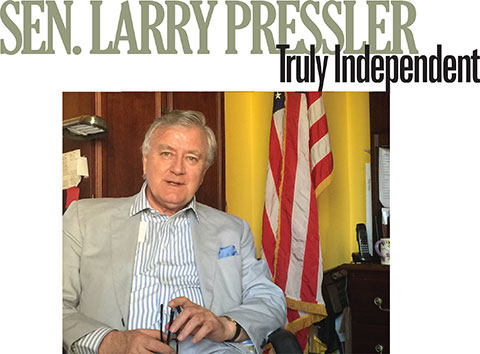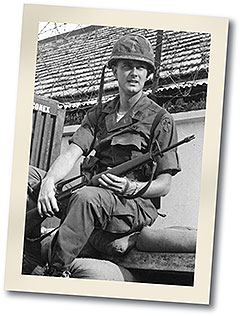 |
||||||||||||
|
November/December 2016
BY WILLIAM C. TRIPLETT Larry Pressler, one of the first Vietnam War veterans elected to Congress, left politics in 1997. Or so he thought. He is now back in the thick of it with a new book in which he argues for, among other things, the absolute necessity for more independent minds and independent party candidates in the American political process. It’s even embedded in the book’s nearly apocalyptic title—Senator Pressler: An Independent Mission to Save Our Democracy. Where does this independent streak come from, particularly for someone who spent twenty-two years in Congress as a Republican? Vietnam. “My generation is torn by the Vietnam experience,” Pressler said in an interview. “Our clarity of thinking isn’t great. We lost our faith in any simple solutions.” Or, as he put it perhaps more poignantly in his book: “My generation’s problem was and is Vietnam.” Indeed, although the war takes up only a single chapter in the book, Pressler’s two tours of duty provide the animating spirit of its thesis. Certainly some of his independence comes from a hardscrabble early life on a South Dakota farm where he was born and raised in the 1940s and ’50s. During his school years, Pressler grew determined not to be limited by the near-poverty of his upbringing, studied hard, and eventually won a Rhodes Scholarship. But it was his time in Vietnam that made him suspicious of institutional authority.
During his second tour he was assigned to MACV, operating between north of Saigon and the Central Highlands. One mission involved verifying body counts, which brought him up close to what high-velocity rounds can do to people. Body counts were, of course, being touted as evidence that we were winning the war, something Pressler would not forget. He was still a believer. Then on another mission, Pressler was aboard a helicopter dropping into a landing zone when mortar rounds hit. His left hand sustained a “slight injury,” he recalled. The commanding officer wanted to write up the action to award Pressler a Purple Heart. He declined because it would have been “disingenuous,” he said. “I had seen severely wounded soldiers who really deserved a Purple Heart and never received one. I saw the awarding of medals as haphazard. “From that point on,” Pressler continued, “I never totally trusted government authority again. This incident is probably the root of my independence.” The root grew deeper with the 1968 Tet Offensive. “I really liked Lyndon Johnson,” Pressler said. “While we were there they’d show us films of Johnson saying how well things were going. I watched all his speeches. I believed him. And then, God, the Tet Offensive.” Any doubt he might have had about whether to trust government or authority vanished in the mayhem the supposedly “losing” enemy wreaked across South Vietnam. No body count could convince him otherwise.
After graduating from Harvard Law School, Pressler returned to his South Dakota hometown and eventually ran for Congress. “I thought I could make a difference,” he said. It was 1975. The nation was still reeling from the Watergate scandal, and the need for governmental reform was patent. He wanted to be part of it, running as a Republican because “the midwestern Republican Party was a reform party and was also very pro-civil rights.” But Pressler said he was never a hardcore partisan, and being a Vietnam veteran “was no political advantage.” It may have been a liability. Whenever around others in Congress who didn’t serve in Vietnam or even in the military, Pressler often felt a negative vibe. For instance, one meeting he attended of the Senate Foreign Relations Committee included former Vice President Dick Cheney, and then-Senators Dan Quayle and Phil Gramm, none of whom served in the military. “We were sending troops somewhere, can’t remember where,” Pressler said. “I was the only dove in the room.” The Vietnam War had made him deeply skeptical of putting American boots on foreign ground, especially for nation-building. “But among these guys who had avoided serving, I sensed that I was resented because I had served in Vietnam.” He believes it cost him. “I learned you’ll get higher in your career if you accept authority,” he said. “Even in politics. You’ve got to work with your party, but I was always too independent.” After losing his re-election bid in 1996, Pressler gave speeches, taught, and went into business. But in 2014, believing that the toxic partisan atmosphere was hurting the nation, he ran as an Independent for the Senate. Pressler lost, but he remains committed to the idea of a truly independent party. “I think we need a new independent party or movement,” he said. “Bernie Sanders isn’t a real independent. I think he’s more a liberal Democrat.” Asked what he hopes people will take away from his book, Pressler replied: “I don’t know exactly. I’m glad I wrote it, but I’d like to rewrite it more focused. I have such a hard time explaining the Vietnam experience. It was so complex in terms of the battles we had, the aid program, and the failure of that, and the people we left behind that got put into camps. Nobody gives a hoot about that.”
|
||||||||||||
|
|
||||||||||||
|
||||||||||||
8719 Colesville Road, Suite 100, Silver Spring. MD 20910 | www.vva.org | contact us |
||||||||||||






















 Larry Pressler arrived in-country in 1966, a brand new U.S. Army first lieutenant fully believing in the war effort, assigned to the Mekong Delta providing security along Highway 4. VC snipers took frequent aim at the American drivers of convoys and their security escorts, but Pressler managed to complete his first tour unscathed.
Larry Pressler arrived in-country in 1966, a brand new U.S. Army first lieutenant fully believing in the war effort, assigned to the Mekong Delta providing security along Highway 4. VC snipers took frequent aim at the American drivers of convoys and their security escorts, but Pressler managed to complete his first tour unscathed.